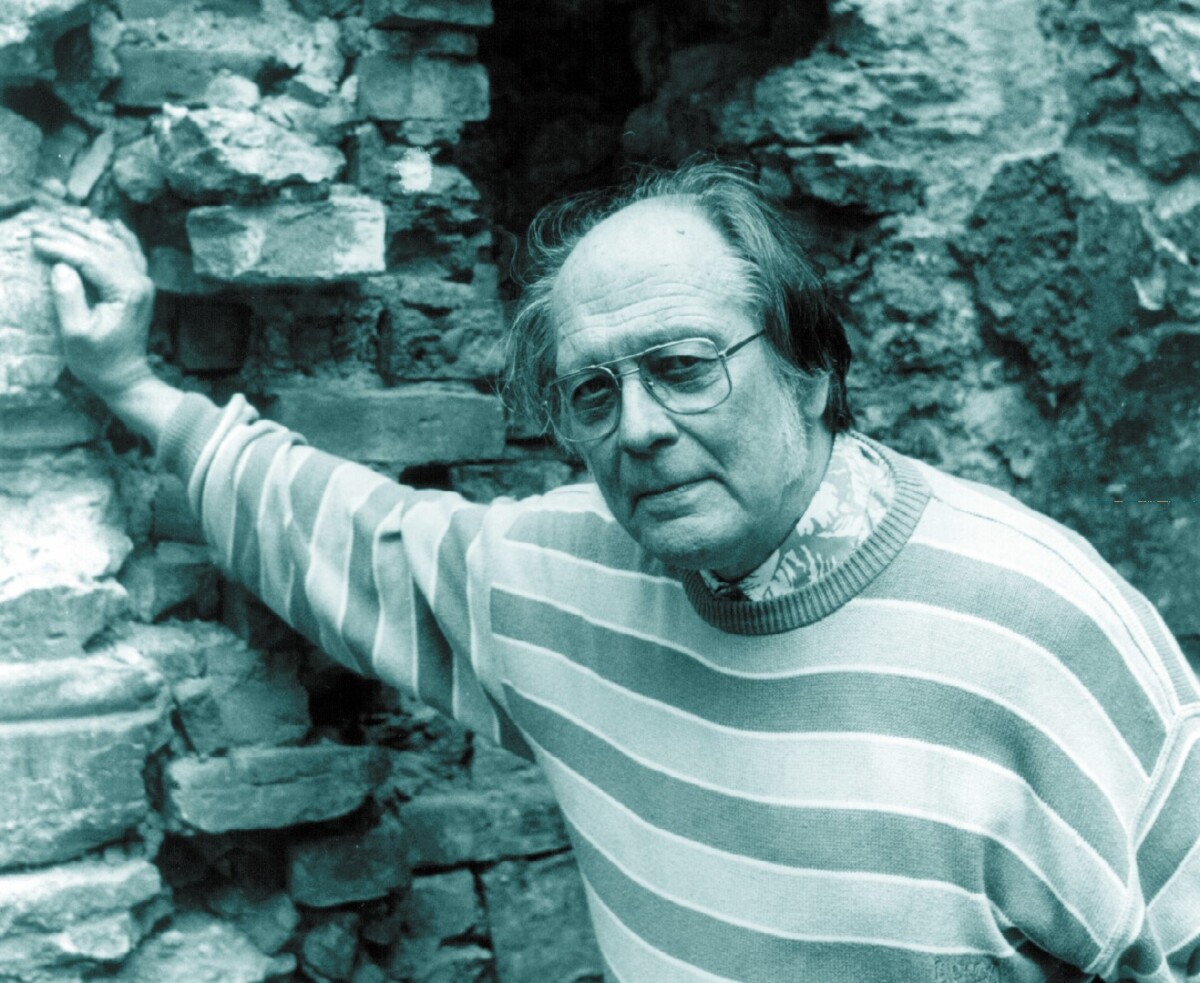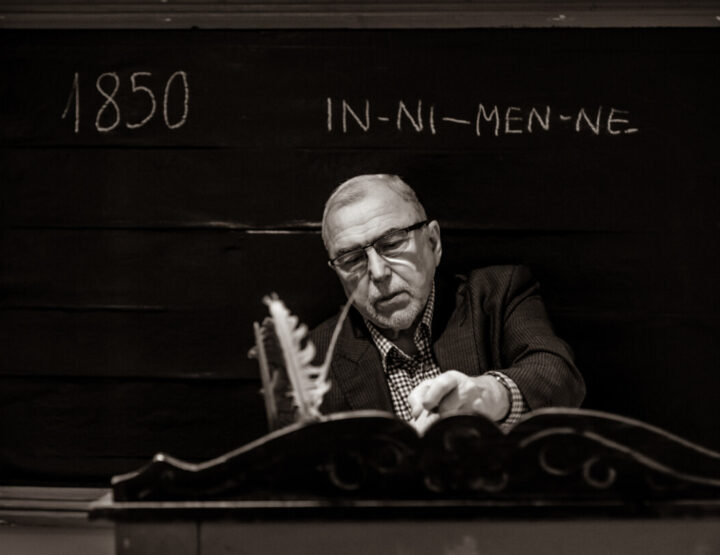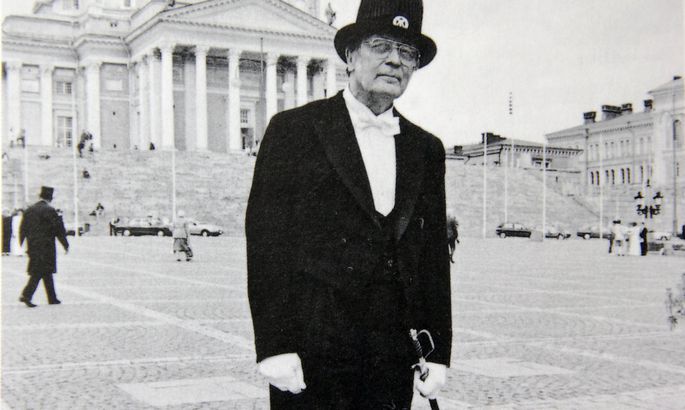Characters:
Jaan Kross, literary classic, 80 years old on 19th February
Ellen Niit, his wife, Estonian writer
Aksel Tamm, Soviet-time publisher, currently presidential adviser;
Oskar Kruus, Kross’s old colleague;
Eva Lille, Estophile, family friend and Jaan Kross’s translator;
Juhani Salokannel, same as above;
Rein Veidemann, literary scholar, former politician;
EWWRU, Estonian writer who wishes to remain anonymous;
All characters are real. All described events have actually taken place. Every word has been written down exactly as uttered.
Jaan Kross’s novels
Jaan: Had I succeeded in escaping to the West in 1944, I would hardly have become a successful lawyer, perhaps I’d have stuck to academic work. Would I have been an Estonian writer over there too? To be a writer in a foreign language would not have probably been morally acceptable.
Aksel: Kross has never been a writer to incite fervour; he was not loved by the readers like, for example, Egon Rannet, and his Stones and Bread.
EWWRU: Kross is probably the only consistently intellectual writer of prose of the 1990s whose work also has some sort of research basis. He builds up great mental constructions, like Eco, although without the latter’s postmodernism. Irony can sometimes be found on the sentence level. And his stylistic armour is so powerful that if a bright idea flashes, the message reaches you with a tremendous roar.
Aksel: Kross’s Swivel Chair Hour was at first rejected by the short imprints series Loomingu Raamatukogu, as a glorification of conformism. However compromising his Four Monologues Concerning St. George, it was pretty good prose. His style has indeed never changed; after all you spend most of your life writing the same symphony anyway.
Jaan: I have never written in order to show how to make compromises, but about how to survive despite them. Everywhere in the world where my books have been read, there have hopefully been a few whohave understood them. Of course my books never cause any earthquakes. They’ve sold best in Finland and Germany. In the latter country, after all, there are still the Baltic Germans who know what I’m talking about. The Finns, too, have the necessary experience.
Juhani: The translator usually lives in the author’s shadow, he’s not noticed. But there have been cases in Finland where people, and strangers at that, stop me in the street and ask when the next Jaan Kross novel is coming out. He is very much admired in Finland, especially by those who really know what they’re talking about, e.g. several professors at the Helsinki University, and the historian Matti Klinge.
Jaan: The book the writer is currently working on should also be the most fascinating one for him, otherwise I’d have to tell myself that I’m now doing something less exciting. A writer cannot afford to adopt this sort of attitude. Between the Three Plagues is of course my most important work, with the highest level of identity between the main character and the author himself.
Eva: I’ve the feeling that when Kross writes, he does it with all his being, as it were. I’ve been present when he has been gathering meat on the bones of his work. He seeks something from every person he meets. Only in his company have I felt that I’m being used as material for a novel. His glance is so penetrating and he tries to enter your world. You listen to him spellbound; sometimes it seems as if you were a character in an opera where director Kross pulls all the strings. There are so many near-fatal incidents in his life, when he’s stayed alive by some miracle.
Jaan: Lucky occasions often come in bursts. In the camps I met a man, an Estonian, whom I had known in my childhood, had sat on his knee. I have also put this story down on paper (as The Ashtray). He was the head of the camp’s construction bureau and he managed to find a job for me there. I had to produce the technical drawings in black ink.
Eva: They make an excellent tandem, Jaan and Ellen. She has never bothered him with practical household matters. I’ve sat on their sofa, dozens of times, and seen Jaan’s eyes gloss over; suddenly he’s miles away, in one of his novels.
Jaan: I’ve never understood what the so-called entertainment industry actually is. Why does one have to be entertained? Ellen describes a half-mythological occasion: I had just finished a novel and decided to rest awhile. Half an hour later, I asked Ellen whether she had seen my notebook somewhere, with my notes. And so, an hour later, I was completely absorbed writing my next book.
Eva: I have seen his hot temper in action. Once on his way to the archives, when he had already gone out, he remembered that he had left some important notes behind, and had to climb to the fourth floor again. All those wasted minutes! I then saw what fury and rage he had in him. There he was – the structure of a novel ready in his head, the passion of a researcher urging him on, and he is surrounded by children, food, clothes, items of boring everyday life…
Ellen is a magnificent writer herself. When I was younger, I was convinced that she had given too much of herself to Jaan. I no longer think like that. They complement one another.
Ellen: Well, a few poems for children can easily be produced even when I’m trying to create suitable conditions for Jaan and his novels. A sometimes check his letters, but I can’t be bothered to type up the novels. Health and memory are so essential. A writer of historical novels must remember what he wrote, even on page 35.
Jaan: I’m having trouble remembering first names. They used to be quite firmly tagged onto the surname, but not any more. But I have not yet noticed any serious deterioration in my capacity to remember.
Ellen: For a writer of novels, I think you are perfectly well acquainted with the factual side of things, so that the plot is convincing. Jaan reads his manuscipts to me. What else can he do, really, when he’s writing them right under my nose.
Jaan: Ellen is naturally my first reader.
Ellen: Most of the time you ignore my remarks completely, sometimes you do take them on board. Your method and style are so well established that it was obviously impossible to sell that half-finished manuscript that got lost.
Perhaps somebody wrapped his herring up in it. But the second version even became a little better.
Jaan: The differences were mostly in the conjunctions. But there may have been some semantic elements which were better united in the second version.
Eva: I used to take groups of culturally interested Finns to the Kross family. I took our own coffee along, of course. The friendliness of that household helped to educate readers. Everybody bought a book and told his friends. Finns, Baltic Germans, friends of friends – they’ve all met Jaan face to face.
Ellen: On one occasion, I think we even had about 40 people in our living room.
Eva: Jaan Kross’ contribution has simply been staggering. He has done so much. But he has paid for that too.
Jaan: All this talk about me as a classic gives me the creeps. But on the other hand – we have to find our classics somewhere, so it looks as if I’ll have to put up with it.
Kross and the Riigikogu
Jaan: My father was a hard-working man, but he was also a society figure and for a time a member of the Tallinn City Council. He was a Strandmann man.
Rein: In 1992, Jaan Kross, who was on the list of the roughly social-democratic Mõõdukad (Moderates) party, was elected to the first Parliament (Riigikogu) of a newly independent Estonia. I remember him walking, suitcase in hand, stooping a little, reminding me vividly of Ullo Paerand from his novel Treading Air (Paigallend). But this comparison could have occurred to me only post factum.
Jaan: I wouldn’t say that the Westholm school injected élitism. In my opinion, élitism means a certain feeling of life-long superiority – come what may, we can take it. But everything Estonian was naturally our prime concern, that was only natural.
Rein: I had the impression that Kross performed his duty as an MP out of compassion for those who had involved him in politics. In that rôle, too, Kross was conscientious, determined and precise. His legal education helped to phrase the finesses of the laws. He seldom appeared at the Toompea rostrum, but always kept to the rules of rhetoric.
Aksel: During his time at the Riigikogu, I once met Kross in the street, and he explained the connection between the constitution and urinating: the former became parlamentarian, because somebody supporting presidentarianism had popped out to pee during the voting. He went to work in the Riigikogu with astonishing conscientiousness.
Jaan: By the way, I recently got a letter from a German publisher with UdSSR written on the envelope. In my reply, I thought to use the address “Gross-Deutschland”, or if that was too provocative, then “Amerikanische Zone”.
Rein: Kross could speak in the Riigikogu ex cathedra, as the occasion required, even using certain rhetorical demagogy. Alas, arguing with Kross was like trying to carry water in a sieve. What he says is so formidably well thought-out and he is so well-armed rhetorically that in the end one always left hopelessly beaten.
Jaan: The Riigikogu was quite a concentrated experience, but I don’t think my contribution had any particular value. I realised that the work at my domestic desk was probably worth more than just being one hundredth part of the Riigikogu members up on Toompea Hill. Still, I made significant observations there which I could not have made anywhere else.
All my life – and I have perhaps been overdoing it a bit – I have tried to prove to myself that I am not a man who can’t do his work properly.
Kross and Nobel Prize
Jaan: Had I received the Nobel Prize in 1990-91, it would have seemed a purely political decision. The situation was too favourable – that was what spoiled the whole thing. I sometimes harbour the illusion that by today I’ve got rid of all of my illusions. The litmus paper of illusion is disappointment, and I don’t really perceive disappointments any more. I’m no longer disappointed in people or how situations evolve. You simply know that besides others, the negative development is also programmed into an event.
EWWRU: Had Kross made a political proclamation of some sort in the early 1990, he would certainly have received the Nobel Prize. But men who’ve been to Siberia tend to be extremely careful. The same goes for Lennart Meri.
Aksel: Kross is not someone who makes political pronouncements.
EWWRU: Kross is a true Estonian, looking after his own interests, but in his works he represents significant values. And he’s a decent writer. If Kaplinski had received the Prize, it would have been like spitting in the face of Kross. But after the ‘Estonia’ ferry disaster, an Estonian writer has nothing more to hope from the Swedish Academy.
Aksel: Kross is now as old as Tuglas was in his last years, but Tuglas at that time was surrounded by a halo of untouchability. Kross at 80 is a perfectly normal person!
Jaan: I’ve no idea whether I have, somewhere on the verge of my subconscious, organised normality contests with literary classics. But I do try to decide and behave like other people in this country at this present time, and it is through this prism that I view my own behaviour. And if, as Aksel Tamm suggests, I have managed to succeed in doing so, then I’m well satisfied.
EWWRU: What is remarkable about Kross is that he has no need to prove himself to anybody, but he’s still beavering away like mad. Well, perhaps you have to prove to yourself at that age that you can still produce something. But the level in Kross’s works is just as high as ever!
Jaan: I don’t perceive in myself any wishes that should be realised beyond myself. The only thing is health – as long as I have that, I shall carry on working. To have normal, unchanging circumstances. Are the circumstances normal? Well, God knows, I wouldn’t want to waste too much time looking for an answer to that question, then time would slip through your fingers.
Jaan Kross 80: Three Dialogues
By Eric Dickens

Jaan Kross –
Share:



